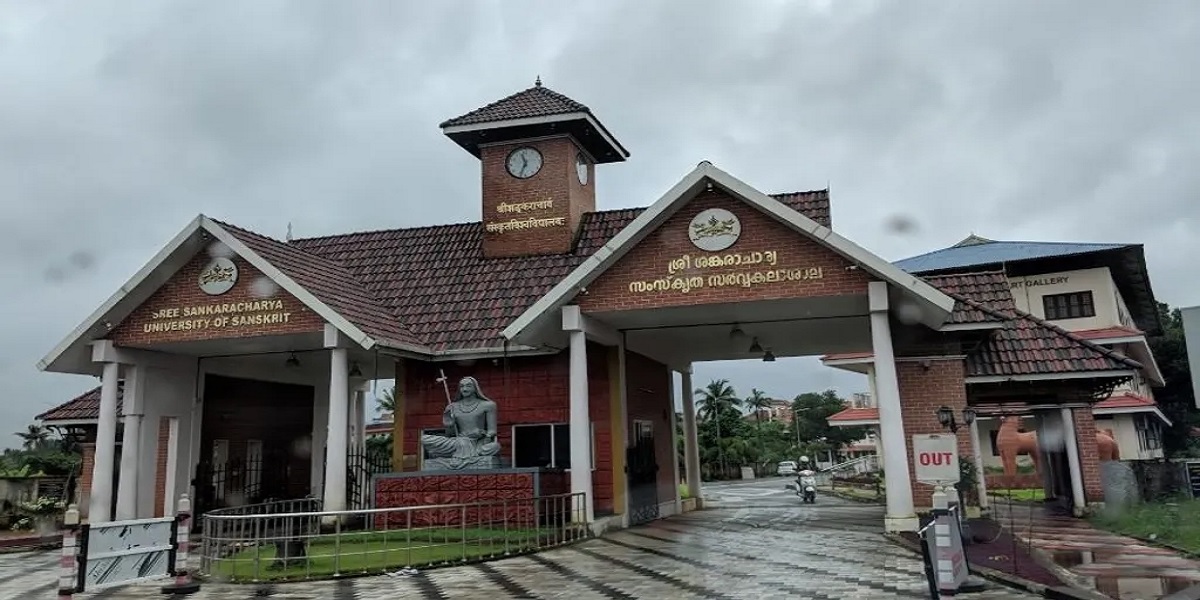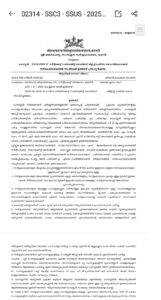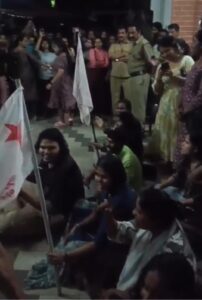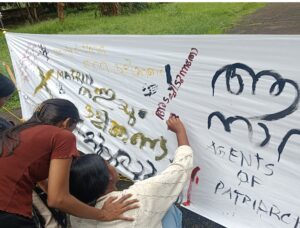Protesting students said the curfew is an attempt to roll back hard-won spaces under the pretext of safety and drug control, reflecting how the state used the pandemic as a means to suppress protests.
Published Jul 04, 2025 | 9:00 AM ⚊ Updated Jul 04, 2025 | 9:24 AM

With the boundary between drug control and authoritarian campus policies rapidly blurring, the protest in Kalady could signal the start of broader resistance across Kerala's campuses.
Synopsis: Students said the fight against substance abuse has now become licensed moral policing. They accused the university authorities of using drug prevention as a pretext to impose intrusive surveillance and restrict freedoms. They raised questions about whether the war on drugs is becoming a war on student rights.
The Sree Sankaracharya University of Sanskrit at Kalady in Ernakulam is witnessing unrest among students, a week after Kerala Chief Minister Pinarayi Vijayan had urged teachers to check the bags of suspicious-looking students without hesitation.
Vijayan made the comment as the state has been cracking down on drugs under the fifth phase of its “No to Drugs” campaign. The students, however, are unhappy, saying the crackdown has crossed the line.
Students said the fight against substance abuse has now become licensed moral policing. Protesting students accused the university authorities of using drug prevention as a pretext to impose intrusive surveillance and restrict freedoms. They raised questions about whether the war on drugs is becoming a war on student rights.
With the boundary between drug control and authoritarian campus policies rapidly blurring, the protest in Kalady could signal the start of broader resistance across Kerala’s campuses.
A recent circular by the university outlines a new set of hostel and campus regulations aimed at tightening control over student movement. The directive is based on recommendations from a committee chaired by University Convener Advocate KS Arunkumar and follows meetings held by Syndicate sub-committee members and hostel authorities on 20 June 2025.

A copy of the circular.
The most significant change is the imposition of a strict curfew. All residents must return to their respective hostels by 9.30 pm. No student is allowed to remain outside the hostels beyond this time unless prior permission is granted and their parents are informed.
Parcel collection is restricted to the Reception Point and permitted only until 9 pm. In addition, only authorised vehicles with valid documentation will be allowed entry to the campus. Students must register their vehicles within 15 days or face possible police action.
While the SFI-led students’ union has agreed with most of the regulations, they highlighted a key contradiction — the university operates a 24-hour library reading room specifically meant for students to study without time limitations.
”If the library is open around the clock, how can the university enforce a 9.30 pm curfew?” they questioned.
Speaking to South First, Aadi — a PhD scholar, queer activist, and Kerala Sahitya Akademi Award winner — questioned the logic behind the new 9.30 pm curfew at the university.
“Universities are spaces of vibrant intellectual and cultural activity. Students gather to protest, paint posters, share meals, rehearse plays, hold discussions, or simply study. In a university with courses in fine arts, theatre, and dance, night hours are often essential for practice.

Aadi has been awarded Kerala Sahitya Akademi Award for his poetry collection ‘Pennappan’ in the Young Poets category.
Research scholars, too, depend on facilities like the 24-hour reading room — a space won through student struggle — especially because hostels lack quiet, well-equipped study environments.”
According to Aadi, the curfew is an attempt to roll back these hard-won spaces under the pretext of safety and drug control, echoing how the state used the pandemic as a means to suppress protests.
”Safety,” they argue, is often used as a cover for surveillance and moral policing. ”Students are not seeking protection from the night, but from the authoritarian gaze.” The real fear, Aadi said, is not about drugs or danger — but about students, especially men and women, freely interacting and claiming their space.
Aadi also raised concerns over the hostel fee hike, noting that while ₹150 per student might seem insignificant to the university administration, it is a considerable burden for many students.
He further highlighted a recent directive from the Kerala High Court, which withheld the salaries of the Vice Chancellor and Registrar of the university until a PhD scholar’s overdue fellowship is released. The court came down heavily on the university, remarking that there is no valid reason to deny a student’s fellowship if the VC continues to receive a regular salary.
When South First contacted Adhwaith, a member of the SFI Ernakulam District Committee, he said, ”After we began our protest on campus against these new restrictions, the authorities assured us that a meeting would be held. But they haven’t informed us of any date yet.

Protest by SFI against new recommendations by the committee.
This is not just about the hostel curfew — a new rule now mandates that classrooms be closed after 5.30 pm, and students are barred from using them afterwards.
How is that even practical in a university that offers courses like BFA? Students in classical dance, theatre, and sculpture need these spaces after regular theory sessions for practice.
“We acknowledge that drug use is a concern on campuses, and we support measures like restricting entry for outsiders without ID cards. But what’s unfolding now under the name of drug prevention is essentially moral policing and authoritarian control. That is unacceptable,” he said.
When South First contacted students who are not affiliated with any political groups, they highlighted several concerns about the university’s shifting priorities.
Athira (name changed), a postgraduate student, told South First, ”If the university is genuinely concerned about student welfare, it should start by allocating funds for the library, restoring access to academic journals, ensuring fellowships for research scholars, and improving hostel mess facilities. Safety doesn’t mean removing students from public spaces—it means supporting them.”
She added that the university hasn’t purchased new books for its library in the past five years and has discontinued subscriptions to key academic platforms like JSTOR, citing financial constraints.
”But at the same time, they spent lakhs on a parking complex for administrators while research scholars went without fellowships for over a year. What does that say about their priorities?”
Athira also pointed out a glaring gender bias in the new hostel rules.
”The saddest part is that our Vice Chancellor is a woman—Prof KK Geethakumary. Yet, rules like informing parents in case of late reporting disproportionately affect girl students. Universities should be moving toward more liberal and progressive policies, not regressing into surveillance and control.”
Also Read:
South First tried to contact the university Vice-Chancellor, but she did not respond. Instead, the university authorities issued a statement defending their decisions and termed the agitation “unnecessary.”

Students protest at the university.
The university maintained that the recent order imposing hostel curfews and restrictions on the entry of outsiders was aimed at ensuring a drug-free, safe, and disciplined campus. Officials alleged that despite prior agreements made in March with student representatives, a section of students was now attempting to sabotage these efforts.
Refuting allegations of unjustified hostel fee hikes, the university clarified that the entrance fee remains ₹100 and the monthly rent ₹150 per student.
It claimed certain student groups were spreading “misleading propaganda” on social media regarding hostel charges.
The administration also expressed concern over recent incidents where students reportedly blocked the university’s main gate at night and held unauthorised midnight film screenings on campus.
On 3 July, the university initiated action against 37 students. It had issued show cause notices to 22 students on 2 July for alleged violations.
Reiterating its stance, the university stated it would proceed with implementing measures for campus discipline and student safety, with the cooperation of teachers, non-teaching staff, parents, and alumni.
(Edited by Majnu Babu).
